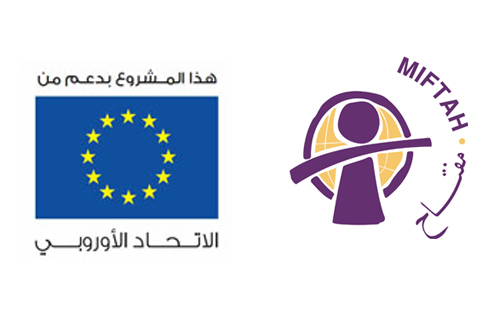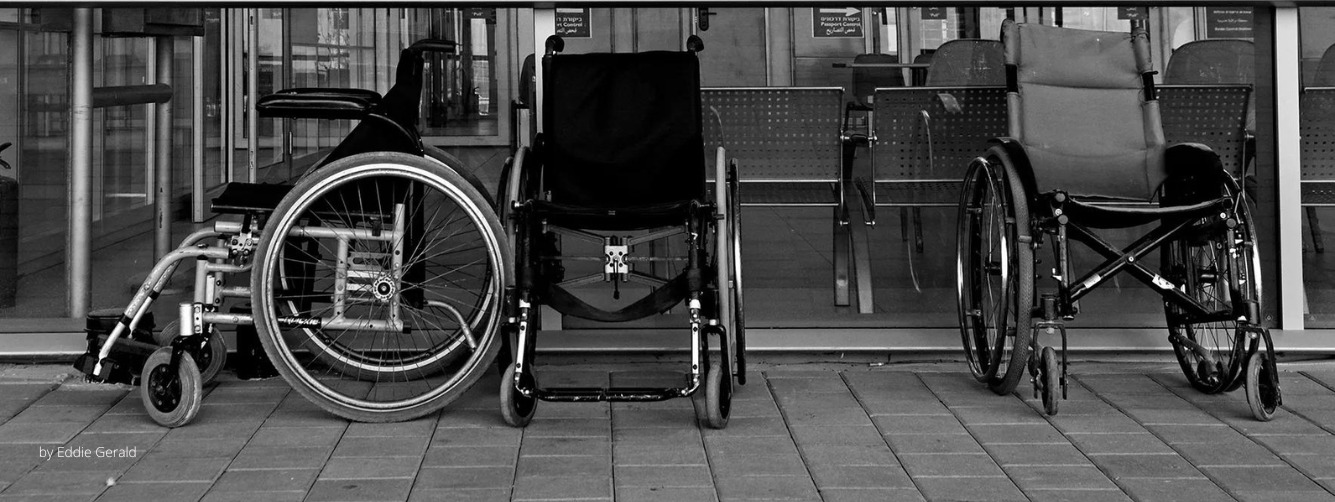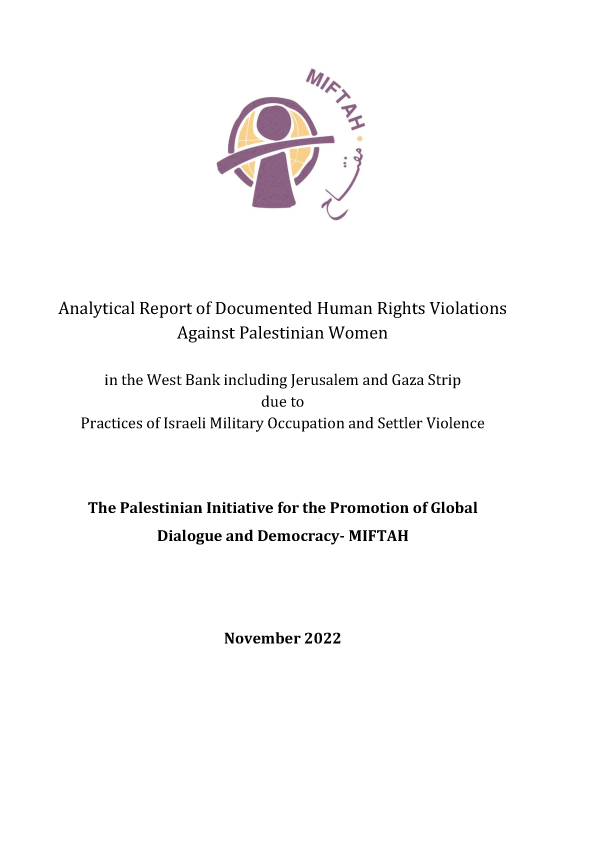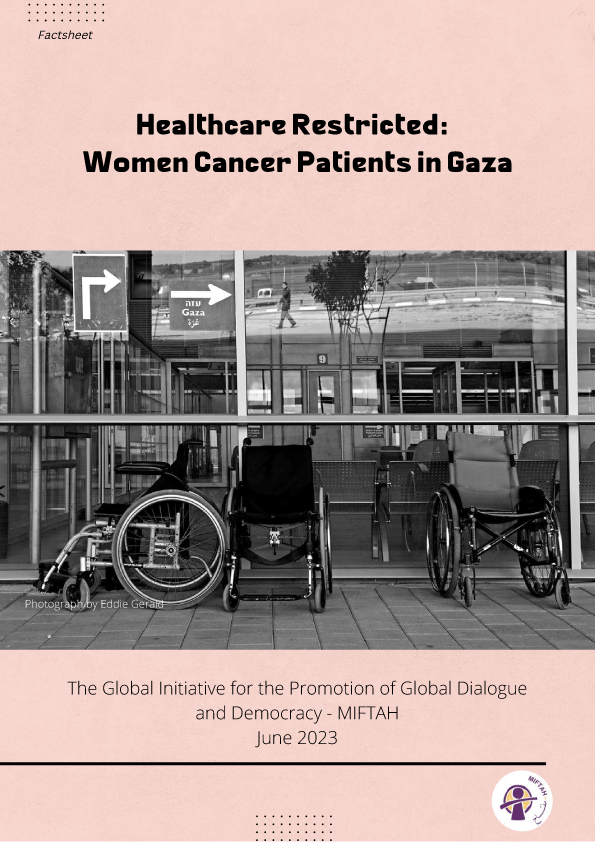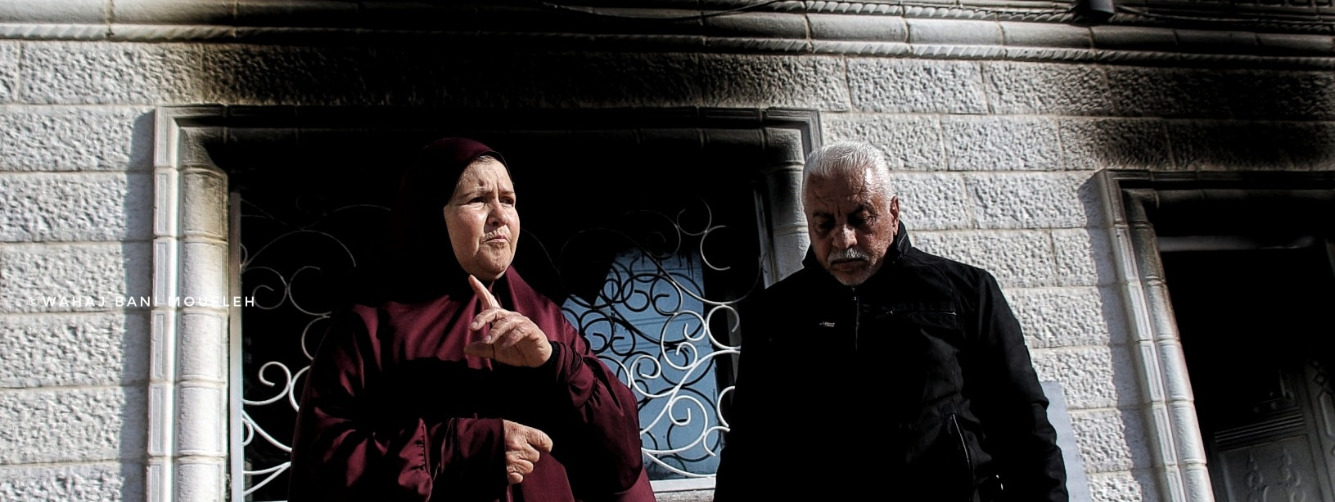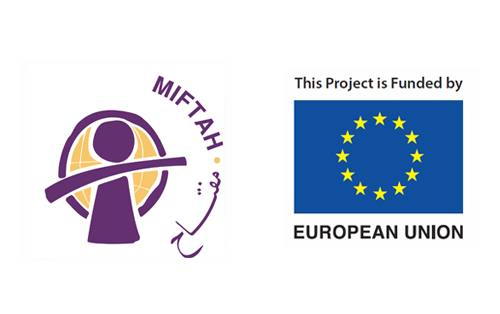
Executive Summary:
This paper presents a review and discussion of the occupation’s Five-Year Plan to Israelize the various sectors of Jerusalem, especially the educational system. Israel allocated more than 2.1 billion Shekels for this purpose. The Plan includes imposing different Israeli tools, mechanisms and pressures on Jerusalemite schools to force them to remove the Palestinian curriculum and replace it with the Israeli one. It also encompasses modifying the contents of the Palestinian curriculum (especially in public schools) and opening new institutes to teach the Israeli “Bagrut” curriculum, while restricting the infrastructure of Palestinian schools. Israel also refuses to give licenses to new schools except if they agree to adopt the Israeli education system. Moreover, the occupation blackmails private schools by threatening to cut off their budgets. These hostile policies culminated with the closure of the Palestinian Ministry of Education Bureau in Jerusalem, in order to eliminate the Palestinian sovereignty and national identity in Jerusalem. This paper discusses these violations by stating different facts and figures, as well as proposing a set of recommendations to confront the aforementioned Plan.
Introduction:
Jerusalem is the cradle of Abrahamic religions and the center of the Palestinian cause. In order to control the city, Israel introduced carefully formulated plans that target all sectors and spheres of Jerusalemite life. Consequently, the city has seen an almost complete collapse in most of its vital sectors, especially the educational sector; which is considered an existential issue par excellence.
The Israeli occupation is following a clear and systematic Judaization policy at all levels in Jerusalem. This policy targets Palestinian Jerusalemites by aiming to erase their national culture and awareness, as well as subjugating and stifling them to crush all forms of Palestinian resistance. Israel also created a peculiar and artificial environment that excludes Palestinians and forces them – in one way or another – to depart from their city.
Numerous violations are being perpetrated against Jerusalemite Palestinians (especially in the educational sector), such as the Israeli checkpoints that prevent Palestinian students from reaching their educational institutions. Israel also attacks schools and throws gas and stun grenades at schools or in their vicinity. Therefore, a child’s way to school is often fraught with great fear and danger. Israel also caused serious problems to Jerusalemite Palestinian classrooms, whereas they do not allocate sufficient budgets to Arab schools in Jerusalem, thus increasing classroom congestion and forcing many students to move to other schools. Israel also puts many underage Palestinian students in home confinement (house arrest), as well as depriving them of the right to receive school education and see their classmates. This in turn prevents children from properly completing their educational journey and seriously affects their mental health. Israel’s unjust practices and human rights and international violations also include preventing Palestinians from receiving an education that represents them and their national culture, whereas Israel aims to replace local Palestinian curriculums with Israeli ones.
Facts and Figures:
The percentage of Jerusalemite Palestinian students in [Israeli] Ministry of Education and municipal schools that either teach a distorted Palestinian curriculum or the Israeli Bagrut, is about 50% of the total number of Jerusalemite Palestinian students. This means that the Israeli occupation has violated the right of approximately 50,000 Palestinian students by forcing them to receive an education that does not suit their national culture and social environment. This was implemented by using a number of methods. For example, in 2011, Israel started modifying the Palestinian curriculums taught in Ministry of Education and municipal schools. In this context, the Municipality reprinted Palestinian curriculums after making their desired amendments to them. This included deleting the Palestinian National Authority (PNA) logo from book covers, as well as removing the Palestinian flag and national anthem from all study materials. There was also the removal of everything related to the Palestinian national heritage and belonging, which were even criminalized because they raise the patriotic spirit among students. The occupation authorities also deleted many poems – such as the Intifada anthem –and Quranic verses that talk about the homeland, martyrs and resistance. Israel also abolished the teaching of the “National Education” subject in all Jerusalemite Palestinian schools. A number of facts were also distorted in these study materials, such as changing the map and names of Palestinian cities and streets and replacing them with Hebrew ones. For example, they replaced the city name “Safad” to “Tsfat”. The occupation also introduced materials that propagate their Zionist narrative and undermine the Palestinian national discourse.
Israelization of Educational Curricula in Jerusalem At the beginning of the 2017-2018 academic year, the Municipality of Jerusalem announced that the number of Palestinian students who were studying the Israeli curriculum reached 5,800, distributed among 12 schools. This represented an increase of 14% from the previous year. The number of these students was only about 1,400 in 2012, which means that a fourfold increase was witnessed in 6 years. This constitutes a violation of the occupied people’s right to use curriculums that suit their national culture and identity.
Statistical information regarding the number of schools that teach the Israeli curriculum fully or partially or which were established by Israel, showed the following:
2018-2019: 41 schools (7,300 students)
2019-2020: 50 schools (8,300 students).
This was accompanied with preventing the Palestinian Authority from operating in Jerusalem and closing the bureau of the Palestinian Ministry of Education in Jerusalem in November 2019. Moreover, the occupation allocated budgets with millions of Shekels in its Five-Year Plan to Judaize the educational sector in Jerusalem.
The table below shows the number of Israeli distortions and falsifications of the Palestinian curriculums in Jerusalem:
| Study Subject | Number of Books | Number of Falsifications |
| Islamic Education | 8 | 35 |
| Arabic | 12 | 221 |
| Social Studies | 6 | 235 |
| Socialization (Social Upbringing) | 4 | 90 |
| National and Life Education | 4 | 32 |
| Science and Life | 10 | 26 |
The Main Policies of the Occupation to Israelize the Educational System in Jerusalem
The major Israeli violations that obstruct the education of Palestinian students in Jerusalem are as follows: home confinement (house arrest), checkpoints and the Apartheid Wall, classroom congestion, and the policy of Israelizing Palestinian curriculums.
There are various bodies supervising the educational sector in Jerusalem. These include the Awqaf Islamic schools, which adopt the Palestinian curriculum, as well as private schools that belong to associations (churches, mosques and charitable institutions) and adopt the Palestinian curriculum, but are subjected to huge Israeli pressures because some of them receive monthly allocated payments from the Israeli Ministry of Education. There are also the Ministry of Education and municipal schools, as well as the “contracted schools” that apply the Israeli curriculum or the distorted Palestinian one. Finally, there are the UNRWA (United Nations Relief and Works Agency for Palestine Refugees in the Near East) schools, which apply the Palestinian curriculum.
The percentage of Ministry of Education and municipal schools that teach either a distorted Palestinian curriculum or the Israeli Bagrut one, is approximately 50% of all schools in East Jerusalem, and they include more than 40,000 male and female students. It should also be noted that the occupation established 12 new schools that apply the Bagrut system entirely, hence there is now a total of 50 schools in Palestinian East Jerusalem that apply the Bagrut system fully or partially.
Note: Currently, there are 12 newly established schools in East Jerusalem that completely apply the Israeli educational system, as stated in reports issued by the Palestinian Ministry of Education. However, a fact sheet published by the Jerusalem Education Forum mentioned that there are 50 schools in East Jerusalem that apply the Bagrut system fully or partially. Therefore, 12 of these schools use the Bagrut system fully, whereas the rest of them (38) use it partially.
The Israeli occupation applies different coercive methods to Israelize the Palestinian curriculums. This includes deleting everything related to the Palestinian national belonging, along with adding materials that propagate the Israeli plans, such as changing the names of Palestinian cities, undermining the Palestinian national discourse and heritage, and deleting poems and Quranic verses that talk about struggles and martyrs.
The second method used by the occupation was the allocation of more than 20 million Shekels to develop educational facilities and infrastructure in East Jerusalem. These funds require that the supported schools would introduce the Israeli curriculum. It is also worth noting that, in 2018, the Israeli government allocated 2 billion Shekels to Israelize East Jerusalem, of which they allocated 445 million Shekels to Israelize the educational sector in the next five years. The aim of this Five-Year Plan (which was introduced in 2018) is to raise the percentage of Israeli curriculum education among East Jerusalem students to 90% by 2022. It also includes threats to withdraw the licenses of private schools that refuse to implement Israeli curriculums, as well as providing incentives to Jerusalemite Palestinian students and facilitating their admission in Israeli universities if they choose to study the Israeli curriculum. This goes hand-in-hand with the closure of the Palestinian Directorate of Education in Jerusalem and restricting the infrastructure of Jerusalemite Palestinian schools, while at the same time opening new Israeli schools. The occupation also introduced a requirement which prescribes that a license would not be given to any new school except if it applies the Bagrut system, not to mention the targeting of private schools by blackmailing them with budgets to pressure them to adopt Israeli curriculum.
This paper proposes a set of solutions and recommendations to confront the ongoing Israeli attacks on the educational sector. This includes supporting vocational education and allocating a budget to enhance it, as well as providing full scholarships in Palestinian universities to Tawjihi (Palestinian matriculation) students from Jerusalem. These costs can be covered by the Palestinian Ministry of Education, in coordination with Al-Quds Fund and Endowment and the Palestinian Businessmen Association. It is also helpful to use Palestinian schools as national centers for supporting and educating the Palestinian youth within extracurricular activities (after school hours). Moreover, it is vital to allocate budgets for supporting private Palestinian schools in Jerusalem so that they would remain steadfast against the Israeli policies and would not succumb to its financial blackmail. The paper also suggests holding a national dialogue and examining the possibility of teaching Hebrew as part of the Palestinian curriculum in Jerusalem. This can help fill the gap used by the Municipality for promoting the Bagrut system, under the pretext that it is better for the labor market than the Palestinian Tawjihi. It can also be presented as a good alternative for the general public.
Budgets:
Israel allocated a budget of 2.1 billion Shekels in its Five-Year Plan of (2018-2022), to take over all sectors in Jerusalem. Its main priority is to completely Israelize the educational system in Jerusalem. In a study conducted by the Jerusalem Education Forum on the situation of education in Jerusalem, it was seen that enormous budgets were allocated by the occupation to control the educational sector in Jerusalem. According to some estimates, Jerusalemite Palestinian educational institutions – which include 85 schools and 125 kindergartens - receive a funding of over 400 million USD annually. Private schools in Jerusalem receive a funding of approximately 40 million USD, whereas this funding comes from the taxes paid by Jerusalemite Palestinians (which amount to 30% of the total taxes paid by both parts of Jerusalem) and is not a “favor” from the occupation. It is a well-known fact that 25% of the taxes collected from East Jerusalem are spent on education, health and infrastructure, and the rest of it is a profit for the occupying power. This is done despite that international law forbids the collection of taxes from occupied people and forces the occupying power to bear the expenses of these sectors.
Israel’s new plan includes the allocation of 120 million USD annually, meaning that an additional 600 million USD will be invested in the five-year period. The budget was divided as follows: 700 million Shekels directly to the education sector, with the allocation of an additional 87 million Shekels for educational facilities, supportive activities and special programs, and the hiring of 10 new inspectors and 30 social workers for Arab schools. Moreover, there was the allocation of 206 million Shekels for extracurricular education (after school hours), whereas schools will be transformed into “community centers” after school hours to conduct targeted activities in a familiar environment for pupils. Israel also allocated 30 million Shekels to work with distinctive Palestinian students and open special classes to attract and integrate them in Israeli higher education institutions. This plan also provides 2,000 university scholarships to Palestinian students in Israeli universities, as well as facilitating their admission in these universities, allocating budgets for teaching Hebrew, and operating vocational schools for female students. This was done to integrate Palestinian students in the Israeli society and convince them that obtaining an Israeli university degree will provide them with decent jobs in the future. Hence, these tools and budgets were used by the occupation to control Palestinian students and their families and impose their coercive power on educational institutions in Jerusalem.
Conclusion:
Since 1967, Israel has been relentlessly trying to impose its educational system on Jerusalemite schools. However, they have seen many failures due to Jerusalemite Palestinian solidarity and rejection of these colonization measures. But these measures are now witnessing a gradual and accelerated success in light of a strongly formulated strategy for Israelizing all sectors in East Jerusalem, especially the educational sector (which is among the most vital sectors). Therefore, the educational sector in Jerusalem is considered the “battlefield” for Palestinian sovereignty and identity and can be seen as a fortress for preserving the Palestinian national identity in Jerusalem. Israel’s war on Palestinian education in Jerusalem aims to eliminate the awareness of Jerusalemite Palestinians, after having undermined their physical existence and seized their lands and properties.
It should be emphasized that the crisis of education in Jerusalem is an existential threat, which requires that the State of Palestine and [Palestinian] Ministry of Education would be particularly concerned with protecting Jerusalem. This requires the designation of suitable budgets, programs and projects that support the steadfastness of Jerusalemite schools and have the Palestinian Authority issue payments to private schools instead of having the latter be reliant upon funds from the Jerusalem Municipality. Moreover, it is important to raise the salaries of Palestinian teachers in Jerusalem, in a way that corresponds with the adequate standard of living; for the purpose of retaining and developing the teaching staff. Popular mobilization must also be done to confront the imposition of the Israeli curriculum and Bagrut exams in Palestinian schools. It is also crucial to urge the Palestinian community, institutions and parents to organize protests and sit-ins in front of schools that agreed to adopt the Israeli curriculum, in order to pressure them to reverse their decisions. Furthermore, all parties must confront the Israeli practice of breaking into schools, searching students and summoning school principals for investigation. This has unfortunately become a common practice in the context of the occupation’s treatment of educational staff and institutions.
In order to confront the Israelization of the educational sector, the Palestinian media (especially in Jerusalem) must effectively reach out to citizens’ conscience and sense of nationalism to strengthen their collective awareness about the dangers of adopting the Israeli curriculum. It is also vital to establish new schools through private institutions (that have a license) to teach the Palestinian curriculum, as well as requesting Palestinian universities to facilitate the enrollment of Jerusalemite students therein. National references/personalities in Jerusalem should also play an active role to call upon private schools not to adopt the colonizer’s curriculum. Parents’ committees must also play an active role in enhancing the work of Jerusalemite schools. These committees can help in formulating an executive plan to develop the various educational aspects. We also suggest the activation of student councils in these schools, as well as unifying the efforts of civil society organizations (CSOs) that work to confront Israelization and Judaization policies. We also recommend unifying the local sources of funding and framing them within a national plan for supporting education. Legal defense should also be provided, through the assistance of a specialized legal body that defends the educational rights of Palestinian Jerusalemites.
It is also essential to introduce awareness-raising, lobbying and advocacy campaigns at the local and international levels, as well as boosting the partnership between official, private and international parties to preserve the Palestinian national curriculum in Jerusalem. The aforementioned issues must also be highlighted in the international arena, especially at the United Nations Human Rights Council.
It is worth noting that the majority of Palestinian schools in Jerusalem are still resilient in the face of Israeli policies (which include “the carrot and stick policy”). In fact, many private schools literally smuggled Palestinian curriculum materials to be able to teach them to their students in their original form without the material distortions introduced by the occupation. As long as there is a will, the Palestinian people will not lack the means for preserving their national curriculum in their occupied capital. It is also possible to form popular action committees to constantly defend Palestinian education in Jerusalem as done in the past. This can express the official and popular rejection of adopting Israeli curriculums in Palestinian schools.
Our Recommendations:
- To work in longer shifts at the Awqaf schools (from 8 a.m. until 3 p.m.) and transform Palestinian Jerusalemite schools into community centers after working hours. This can be an alternative to the “community centers” affiliated with the [Israeli] Municipality of Jerusalem.
- Study the option of teaching Hebrew at the Awqaf schools in Jerusalem, in order to eliminate the loophole used by the Municipality to promote the Israeli Bagrut system. This can be done by holding a national dialogue (including the Palestinian Ministry of Education, parents’ committees, civil society organizations, etc.) and examining the possibility of teaching Hebrew as part of the Palestinian curriculum in Jerusalem. This can help fill the gap used by the Municipality for promoting the Bagrut system, under the pretext that it is better for the labor market than the Palestinian Tawjihi. It can also be presented as a good alternative for the general public.
- Support vocational education and allocate a special budget for enhancing it based on the labor market needs. This can be a great alternative for students who do not want to receive academic education.
- Provide full university scholarships to all Jerusalemite Palestinian Tawjihi students, in order to support the continuous adoption of the Palestinian national curriculum.
- The State of Palestine must allocate sufficient budgets to support private schools in Jerusalem, in order to prevent their blackmail by Jerusalem Municipality budgets.
- Enhance the role of the Palestinian media and organize lobbying and advocacy campaigns at the local and international levels.
- Implement awareness-raising campaigns for parents and the local community. It is also recommended to form a committee comprised of the Palestinian Ministry of Education, parents’ committees, and representatives of private schools and NGOs, to coordinate joint efforts in the framework of a national action plan for protecting Palestinian education in Jerusalem.
- The State of Palestine must implement its five-year sectoral development plan in Jerusalem (2017-2021), which aims to protect the Palestinian educational system. This requires designating substantial budgets to support this sector in Jerusalem.
- The procurement of buildings to convert them into schools that apply the Palestinian curriculum in Jerusalem (under the umbrella of the Jordanian Ministry of Awqaf), in order to increase the number of schools and pupils who learn the Palestinian curriculum in Jerusalem.
This Policy Paper was prepared as part of the “Youth as Human Right Defenders” project funded by the European Union The content of this document does not reflect the official opinion of the European Union. Responsibility for the information and views expressed in the study lies entirely with MIFTAH.




